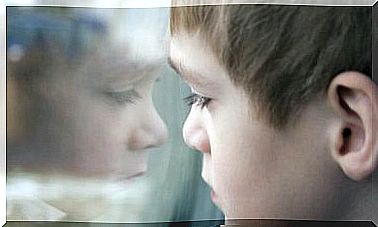Rich Child Syndrome: Does Your Child Have It?

Today’s parents do not have it easy. Many times it is most difficult to have to spend so much time at work and less time with the children.
As a result, children may experience a vacuum that is sometimes compensated for by mistakes. From this arises rich child syndrome.
This syndrome does not only affect those who grow up in a wealthy family. It affects both rich children and middle-class children. The “rich child” is created by upbringing characteristics, not socioeconomic class.
Rich child syndrome describes a child who is spoiled. The result of raising a child in abundance. So this syndrome is not a condition associated with social class, but rather how parents raise the child and what kind of relationship they have.
What is rich childhood syndrome?
The syndrome of the rich child is defined as the set of disorders that occur in a child when it has everything in abundance. Maybe “everything” is not quite the right word… either, they have “everything” they ask for.
In addition to getting what they want, children with this syndrome will also get things from their parents: privileges, access to more educational experiences, etc.
The point is, parental behavior is important. Whether they are overprotective or giving their children too much material things, their actions have consequences for the child’s emotional development.

Ralph Minear, a professor of pediatrics at Harvard University, suggests a series of questions to assess whether a child is being raised with the rich child syndrome.
- Do you often buy your child expensive gifts, even when it is not a special occasion?
- Are costs to the home for the purpose of facilitating the child’s impulses?
- Can the child watch more than two hours of TV a day?
- Is he or she registered for leisure activities without having asked to be?
- Do you reward the child with money or gifts when he or she does a good deed?
- Does the child often complain of boredom? Do they not know how to entertain themselves in a room full of toys?
If any of these questions are answered with “yes”, the child is likely to develop rich childhood syndrome. This is because in most cases the parents do not have enough time to spend with their children.
Parents compensate by giving their children too much freedom, making rules more flexible and giving toys, experiences and money when the child asks. They hope this will give them a “better life” or prepare them to be “better” than others.
The cycle
Most of these parents do nothing but work to give their children a life full of comforts. They assume that is what the children want: expensive things, few restrictions, and many activities planned to pass the time.
They believe that the more “full” a person is of things, the happier it is. In contrast, every unfulfilled desire, every emptiness, suffering and misfortune constitutes.

These parents will also put their children on the path to total success as soon as possible. They want to raise them to be above average. That is why they register them on so many courses and leisure activities.
They do not let the children do what they like or are good at themselves, or develop naturally. These children gain access to the adult world at a young age.
Pressure and dissatisfaction
Today’s children are not so different from previous children. In their hearts they have the same needs as children 20 years ago. They want to play, laugh, interact with nature and animals.
Above all, they will be loved. The presence of their parents gives them self-confidence and a sense of well-being that is irreplaceable.
Some parents do not understand why their children may become so frustrated, upset and ill, or develop certain phobias. They have good intentions, but fail to see the difference between helping a child reach his potential and supporting him, and pleasing and pushing him.

Pediatrician Ralph Minear has five tips for raising children. They are worth some reflection.
- When there is too much freedom, the result can be moral disorientation and lack of discipline.
- Too many material gifts are usually a substitute for company and true love from the parents.
- If there is too much pressure for them to excel, children often react with stress and have difficulty deciding on their own goals.
- Too much information can lead to confusion.
- Too much protection prevents them from preparing for the challenges of life.
It is important to understand that a healthy development of a child largely depends on a balance between fulfilled desires and frustrations. Between conquests of personal freedoms and imposed boundaries.
A good upbringing is based on true love, which is able to teach a child to appreciate things and experiences.









